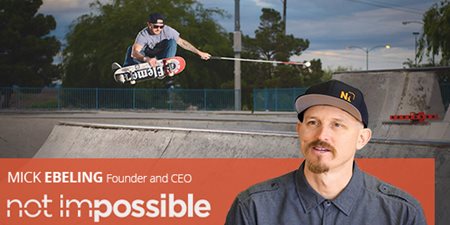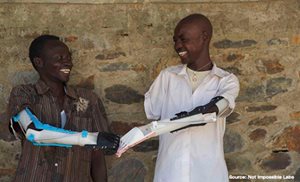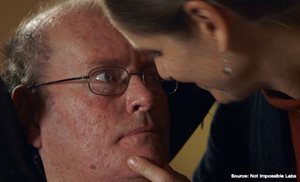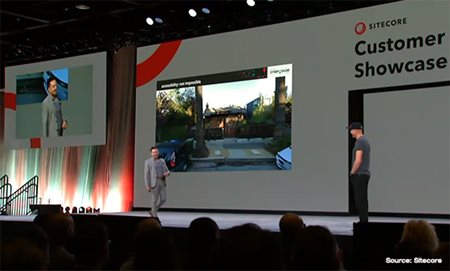Accessibility is Not Impossible
At CMS-Connected, we focus on reporting the latest news and providing in-depth analysis of current events and interests within the digital experience industry. From time to time, we happen upon exceptional customer stories coming out of the industry, which we feel compelled to share with our readers. Today, CMS-Connected is proud to share our latest industry-related, human-interest story — one we feel is quite remarkable.
During CMS-Connected’s recent coverage of Sitecore and Symposium 2019, we learned about an enterprising group of people that have developed accessibility technology designed to assist individuals with extra needs — a company called Not Impossible Labs. Along with their poignant story, we explore the aspect they were able to upgrade their online digital experience with their implementation partner, Verndale.
Not Impossible Labs endeavors to remove barriers from experiencing the world in ways that most of us take for granted — where the physically challenged can use technology to express themselves through their own art creations independently, the hearing-impaired can perceive music on levels not previously achievable, or where prosthetics are engineered and produced from 3D printers to be made readily available to amputees in the developing world.
We were privileged to sit down with Mick Ebeling, Founder, and CEO of Not Impossible Labs, and Ross Lucivero, Managing Director at Verndale, to get the inside view about their partnership and the inspirational story behind Not Impossible.
Not Impossible Labs set out to solve 'absurdities' in the world by looking at accessibility through the lens of technology to work around impediments that exist for many. “We incubate tech that accomplishes social needs and tries to change the world in some way,” Mick Ebeling tells us. They advance innovations to prove that ‘nothing is impossible forever.’
Not Impossible's methodology begins with ‘help one, help many’ — the idea being that by starting with one specific person to solve one specific problem, the positive result will propagate to reach other people with similar challenges. It is this incredible moto that has led Mick and his team to create solutions that have changed lives.
The journey began when Ebeling met a graffiti artist named Tony Quan — also known as Tempt One — who had been diagnosed with the degenerative nerve disorder, amyotrophic lateral sclerosis (ALS). The ALS eventually caused the full paralysis of Tempt One’s body, except for his eyes. For seven years, Tempt One wasn’t able to do his art, until Ebeling, who was the CEO of an animation and production design company, was inspired to innovate a way to enable Tempt One to draw using his eyes. Ebeling gathered a group of brilliant minds together, and they got to work. They conceived and designed a device called the EyeWriter, which gave Tempt One the means to once again draw and bring joy back into his life.
Inspired by the achievement of the EyeWriter, Not Impossible Labs was born. Ebeling and his crew began to take on other incredible projects to prevail over the ‘absurdities’ that people with exceptional needs contend with daily. Examples of such successes were:
-
The skateboarder — who while on his way to becoming pro — lost his vision, which ended his dream pursuit. He was provided with a way to skate again through an innovation called the Sonic Localizer. The adaptive technology utilizes sounds to signal ramps and other obstacles that allow the skateboarder to navigate his surroundings.
-
When the Impossible Labs team went to Sudan to 3D print a set of prosthetic upper limbs for a boy who lost both of his arms to a bomb strike. After achieving the results they sought, the team then built the first-of-its-kind 3D printing lab and taught locals — most of whom have never used any technology — to operate the printer to produce prosthetics for other amputees.
-
The incredible story of a man named Don, who had lost his voice, along with most of his other physical abilities, due to ALS. Don hadn't spoken since 1999 after being fitted with a ventilator that aided him to b reathe. Using similar technology to the EyeWriter, the Not Impossible Labs team configured a device that gave Don the ability to form sentences via the use of his eyes that could then be played back audibly. Don’s first audible sentence? Telling his wife, Lorraine, who had been taking care of Don through it all, “I love you.”
reathe. Using similar technology to the EyeWriter, the Not Impossible Labs team configured a device that gave Don the ability to form sentences via the use of his eyes that could then be played back audibly. Don’s first audible sentence? Telling his wife, Lorraine, who had been taking care of Don through it all, “I love you.”
Be sure to go to https://www.notimpossible.com/projects to watch more videos about all of Not Impossible Labs’ initiatives.
It’s these types of stories that make Not Impossible Labs stand out as extraordinary innovators in the field of accessibility. One of my favorite stories — one that really resonated with me — was the Project: Music Not Impossible initiative. The project’s aim was to create a way for people in the deaf community to enjoy live music and share the thrill of concert performances alongside those who are hearing-typical. The hearing-impaired users wear a vest that transmits in-tune vibrations through the body, giving the wearer the ability to experience the music on an all-encompassing level. Not Impossible held a concert for 200 attendees — a blend of deaf and hearing people — whom all donned the specialized wearable. For some hearing-impaired individuals, it was their first-ever concert; for others, it was their first time attending with hearing-typical friends and family. The magnitude of the impact on everyone in the crowd, all feeling the music together, made for a deeply emotional and unforgettable event.
Web Re-Design
Along with Not Impossible’s inspiring stories and moving videos, their recent website re-design with Verndale is a compelling tale as well. Mick Ebeling was a speaker at the 2018 Sitecore Symposium, and Verndale’s Ross Lucivero happened to be sitting in the audience. Lucivero was profoundly affected by the Not Impossible Labs story and was intent on connecting. “It wasn’t exactly clear to me how we were going to work with them or partner with them; I just knew we had to work with them,” said Lucivero.
Fast-forward a few months. Lucivero led Verndale — the end-to-end customer experience agency who has worked with Sitecore since 2007 and is a platinum partner — into a website re-design for Not Impossible Labs. Lucivero discovered that Not Impossible’s site did not fully convey the significance of the technical and accessible work that Not Impossible was doing. This realization gave Verndale its purpose to work with Ebeling to deliver everything Not Impossible needed from a website. “At Not Impossible, one of our mission statements is to change the world through technology and story, so our website had to do that,” Ebeling shared with us. In keeping with Not Impossible's forward-thinking and outside-of-the-box mentality, Verndale needed to provide a website that honored those values.
 Verndale set out to design a site that reflected Not Impossible’s mission statement, and that was accessible to all. The site had to be simple to use, allow for quick and easy administration, and offer personalization options. With the use of Sitecore, Verndale was able to provide Not Impossible Labs with a much-improved and impressive website.
Verndale set out to design a site that reflected Not Impossible’s mission statement, and that was accessible to all. The site had to be simple to use, allow for quick and easy administration, and offer personalization options. With the use of Sitecore, Verndale was able to provide Not Impossible Labs with a much-improved and impressive website.
Combined with the usual accessibility functions, the site features, what Verdale terms, a self-service accessibility toolbar to allow site visitors to customize their experience by changing font type and size, brightness, color theme, and page interactions.
“Being built on a robust CMS is actually really helpful,” Ross Lucivero told us about the implementation they were able to pull off in record time. “Being able to use things like personalization, because Mick and his team, they talk to so many different audiences about the same thing, right, they talk about somebody who wants to get involved in a project, they might talk about somebody whom they want to help. They have all this content, but the way that people interact with it is very different, so being able to use Sitecore to personalize that experience is really powerful and should be really helpful for them.”
Not Impossible now has a fully developed site to optimize its valuable content and checks all of the boxes it requires to meet the needs of people who visit. “Everything we do at Not Impossible is not just about accessibility for the people who need it, but also for the accessibility for the people who want to help,” Ebeling explained.
What’s next?
Not Impossible Labs’ latest initiative is Hunger: Not Impossible. The project aims to bring proper nourishment to close to 50 million Americans who suffer from hunger and food insecurity. Hunger: Not Impossible uses a text message-driven platform that connects those in need access to a free, healthy meal.
Ebeling speaks passionately about this endeavor and is working on expanding its reach across as much of the country as possible. More information is available at www.notimpossible.com/projects/hunger-not-impossible.
If you would like to donate or get involved with Not Impossible Labs visit their Get Involved page to find out what you can do.

Erika Jones
Erika Jones is a Tech Reporter and Content Marketer with CMSC Media. Erika enjoys combining her creativity with her technical skills through graphic design. She has a background in communications and marketing and has a flair for social media and content creation. Erika is an avid traveller and enjoys seeing firsthand how technology connects us all in business and pleasure.